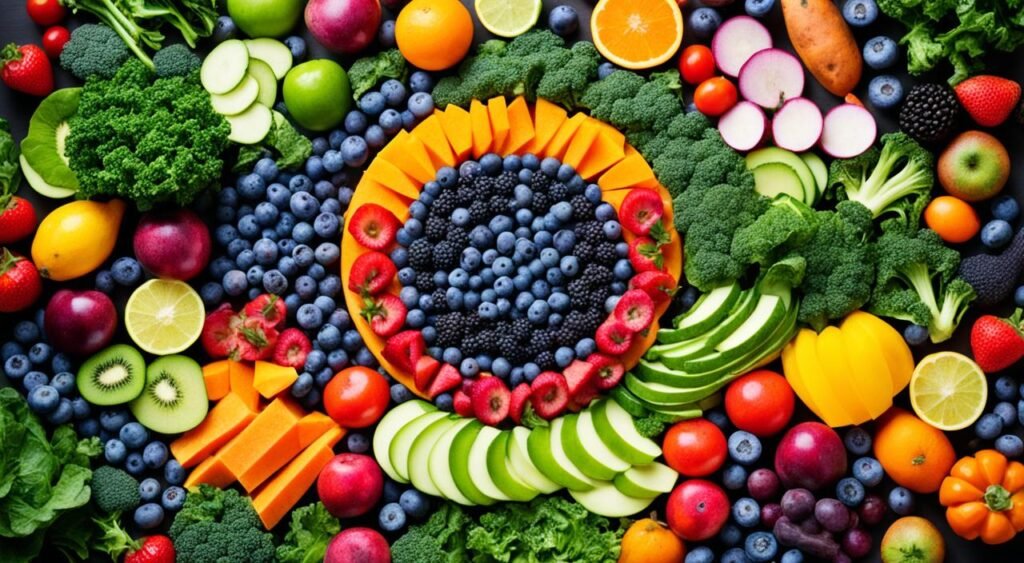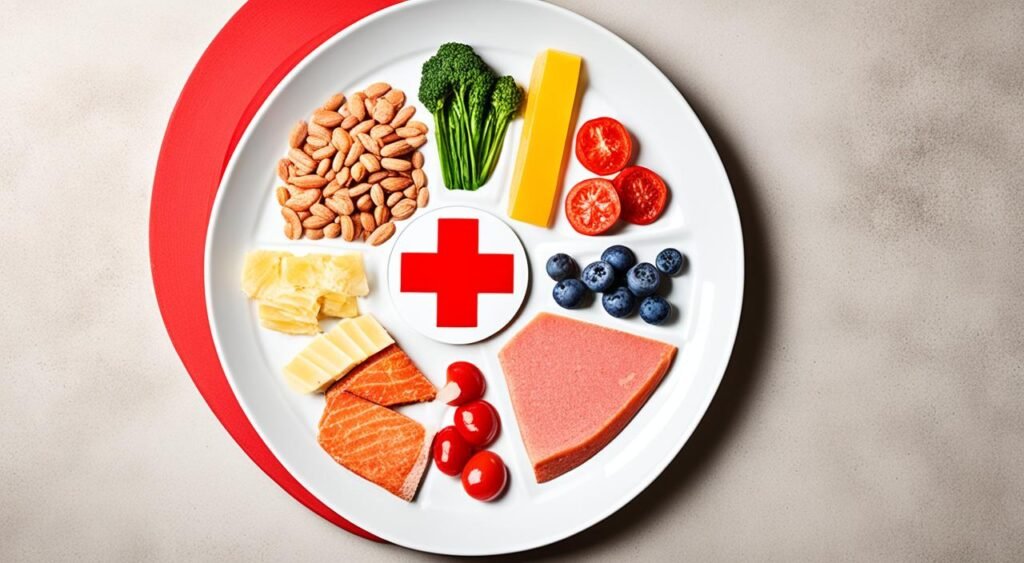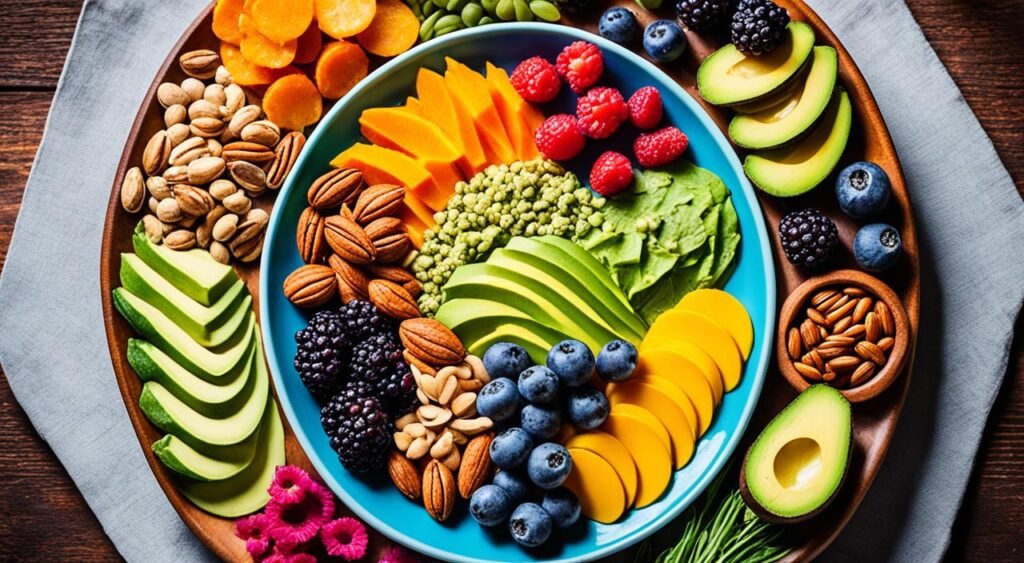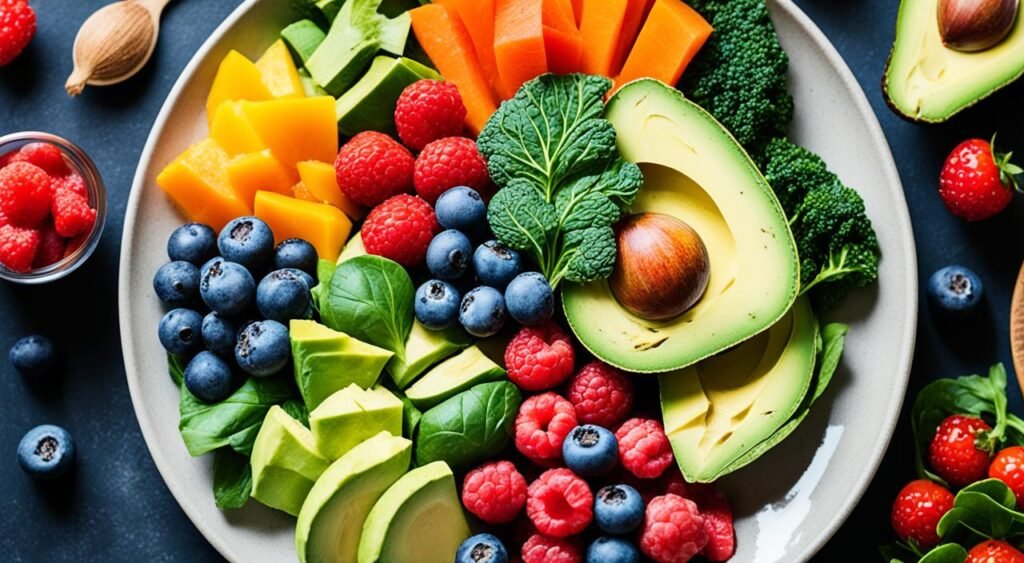Anti inflammatory Diet: An anti inflammatory diet is all about eating foods rich in nutrients. These foods help reduce inflammation in your body. You should eat lots of fresh fruits, vegetables, whole grains, and healthy fats.
To fight inflammation, limit processed foods, alcohol, and red meat. Instead, add more plant-based foods to your meals. Whether this works for you depends on your health and what’s causing your inflammation.
Key Takeaways
- An anti-inflammatory diet emphasizes nutrient-dense foods like fruits, vegetables, whole grains, and healthy fats.
- Reducing the intake of processed foods, alcohol, and red meat may help manage inflammation.
- Dietary changes can potentially address both short-term and long-term inflammation, though their effectiveness depends on individual health factors.
- Incorporating more plant-based options into the diet is a key aspect of an anti-inflammatory approach.
- Addressing inflammation through diet can be a complementary strategy alongside other medical treatments.
What is an Anti-inflammatory Diet?
An anti-inflammatory diet focuses on eating foods that reduce inflammation in the body. It’s about changing what you eat to help manage health conditions. This way of eating includes foods high in antioxidants. Antioxidants can stop cell damage and lower inflammation.
Understanding Inflammation
Inflammation happens when the body reacts to irritation, injury, or infection. Acute inflammation helps with healing, but ongoing or chronic inflammation is bad. It can lead to serious health problems like heart disease, diabetes, and cancer. What we eat can either make inflammation worse or better.
The Role of Antioxidants
Antioxidants protect the body by stopping unstable molecules from causing harm. These molecules can damage cells and lead to inflammation. Fruits, veggies, whole grains, and some fish are good sources of antioxidants. Eating these foods fights inflammation and keeps you healthy.
| Antioxidant-Rich Foods | Inflammatory Foods |
|---|---|
|
|
“Eating a diet rich in antioxidants can help neutralize free radicals and reduce inflammation, supporting overall health and well-being.”
Types of Anti-inflammatory Diets
An anti-inflammatory diet can vary based on personal needs. However, there are several popular diets with anti-inflammatory principles. The Mediterranean diet and the Dietary Approaches to Stop Hypertension (DASH) diet are two well-known examples.
Mediterranean Diet
The Mediterranean diet mainly includes plants. It focuses on eating fresh fruits, vegetables, whole grains, legumes, and nuts. It also uses healthful oils like olive oil. This diet is great for the heart and can lessen inflammation. It achieves this through nutrient-dense and antioxidant-rich foods.
DASH Diet
The DASH diet was created to lower high blood pressure. It recommends eating lots of fruits, vegetables, and whole grains. It also says to use healthy fats but avoid too much salt and processed food. Studies have found it reduces inflammation when compared to a Western diet.
Both the Mediterranean diet and the DASH diet are excellent for fighting inflammation. They are great choices for those wanting to eat more anti-inflammatory foods.
“The Mediterranean and DASH diets are two of the most well-researched and effective anti-inflammatory eating patterns, providing a wealth of benefits for overall health and well-being.”
Conditions That May Benefit from an Anti-inflammatory Diet

An anti-inflammatory diet can help with issues that get worse from chronic inflammation. This includes autoimmune diseases, inflammatory bowel disease, cardiovascular disease, and Alzheimer’s disease.
This type of diet can lower the chance of getting certain cancers too. It focuses on foods filled with antioxidants.
Autoimmune diseases cause the immune system to mistakenly attack the body. This diet, with its focus on natural, nutrient-rich foods, tackles the root of inflammation. It might also ease symptoms.
For those dealing with inflammatory bowel disease, this diet plan could be key. It aims to calm inflammation in the gut. By avoiding certain foods and choosing anti-inflammatory ones, it can help avoid episodes.
Cardiovascular disease is also tied to ongoing inflammation. A diet that fights inflammation can lower the heart disease risk. It includes heart-healthy fats, whole grains, and colorful fruits and veggies.
Research hints this diet could be good for the brain too. It might slow down Alzheimer’s disease by cutting down inflammation and oxidative stress in the brain. This may keep thinking skills sharp for longer.
While we need more studies, signs show an anti-inflammatory diet could be a wise choice for many. It may help support health and wellness for those with inflammatory-related conditions.
Foods to Include in an Anti inflammatory Diet

An anti-inflammatory diet is great for managing pain and staying healthy. It focuses on eating foods packed with nutrients. This helps fight inflammation in the body. The diet includes fruits, veggies, whole grains, beans, good fats, and fish.
Fruits and Vegetables
Fruits and veggies have lots of stuff that fights inflammation. This includes antioxidants, vitamins, and minerals. Try to eat a rainbow of these foods for the most benefits. Some top choices are berries, greens, tomatoes, peppers, and broccoli.
Whole Grains and Legumes
Whole grains and legumes help by keeping our bellies healthy. They have fiber that’s good for fighting inflammation. You might enjoy whole grains like quinoa, brown rice, and whole wheat. Legumes such as lentils, chickpeas, and black beans are also good choices.
Healthy Fats and Fish
Good fats are important too, like the ones in avocados, nuts, and seeds. They have omega-3s, which are anti-inflammatory. Fish also has these healthy fats. You can find them in salmon, mackerel, and sardines.
| Food Group | Examples of Anti-Inflammatory Foods |
|---|---|
| Fruits and Vegetables | Berries, leafy greens, tomatoes, bell peppers, broccoli |
| Whole Grains and Legumes | Quinoa, brown rice, whole wheat, lentils, chickpeas, black beans |
| Healthy Fats and Fish | Avocados, nuts, seeds, salmon, mackerel, sardines |
Adding these foods to your daily meals can help keep you healthy. It’s a step in the right direction for your health and well-being.
Foods to Limit or Avoid

When on an anti-inflammatory diet, cutting down on certain foods is key. These foods may cause or make inflammation worse. They include processed foods, items high in saturated and trans fats, and more.
Processed Foods
Processed items often contain things like added sugars and refined carbs. They’re big culprits in causing more inflammation. Foods like this should be off your list or eaten rarely. Here are some examples:
- Baked goods (cookies, cakes, pies)
- Snack foods (chips, crackers, pretzels)
- Frozen meals and fast food
- Processed meats (hot dogs, sausages, bacon)
- Sugary drinks (soda, sports drinks, juices)
Saturated and Trans Fats
Saturated fats and trans fats can also spark inflammation. Think fried foods, baked goods, and certain snacks. Try to keep foods rich in saturated and trans fats out of your meals. Here’s a list:
- Fried foods (French fries, fried chicken)
- Baked goods (cookies, pastries, doughnuts)
- Margarine and shortening
- High-fat dairy products (butter, cheese, cream)
- Processed meats (hot dogs, sausages, bacon)
Avoiding these inflammatory foods can lower inflammation. It also helps your body heal naturally.
Anti inflammatory Diet for Vegetarians and Vegans

Going for an anti-inflammatory diet is smart for vegetarians and vegans. It helps them decrease body inflammation. This diet mainly includes natural, whole foods. It avoids highly processed foods and saturated fats.
Research shows that people who avoid meat tend to have lower body inflammation. Yet, skipping processed foods for plant-based ones is the key. This swap brings all the diet’s anti-inflammatory benefits.
Building an Anti-inflammatory Vegetarian or Vegan Diet
To build this diet, add the following foods:
- Fruits and vegetables, which are high in antioxidants and anti-inflammatory compounds
- Whole grains, such as brown rice, quinoa, and oats, which provide fiber and complex carbohydrates
- Legumes, including beans, lentils, and chickpeas, which are packed with protein, fiber, and beneficial nutrients
- Healthy fats from sources like avocados, nuts, seeds, and plant-based oils
- Turmeric, ginger, and other anti-inflammatory herbs and spices
Eating these rich foods while cutting down on processed and fatty items makes a strong diet. It fights inflammation and boosts health.
“A well-planned vegetarian or vegan diet can provide all the necessary nutrients to support an anti-inflammatory lifestyle.”
Focus on eating whole, fresh foods that are full of antioxidants and fiber. Choosing these foods will ease inflammation and make you feel better.
Tips for Transitioning to an Anti-inflammatory Diet

Moving to an anti-inflammatory diet is a big change. But, sticking to it with the right plan can be very rewarding. These are some steps to help you switch your diet:
- Gradual Shift: Don’t change everything at once. Start by switching out bad foods for healthier ones slowly. This way, you’ll find it easier to keep up with the new diet long-term.
- Increase Fruits and Vegetables: Add more fruits and veggies to what you eat. Include many different colors, because they’re full of good stuff that fights inflammation.
- Stay Hydrated: Water, herbal teas, and a bit of coffee can keep inflammation down. They also help you stay healthy.
- Prioritize Sleep: Good sleep helps your body manage inflammation. Stick to a bedtime and make your sleep area calm to sleep better.
Follow these hints to change your diet slowly and in a way you can keep up with. You’ll soon feel the great effects an anti-inflammatory diet brings.
Getting on an anti-inflammatory diet is different for everyone. It might take time to figure out what’s best for you. Just be patient, try things out, and be happy about any progress you make.
Anti inflammatory Diet

Following an anti-inflammatory diet is key to reducing inflammation. It can help symptoms of conditions like rheumatoid arthritis, heart diseases, and Alzheimer’s. While the perfect anti-inflammatory diet varies, certain foods can decrease inflammation and lower disease risks.
An anti-inflammatory diet focuses on fresh fruits, vegetables, whole grains, and healthy fats. It includes spices and herbs known for fighting inflammation. Eating these foods brings powerful nutrients and phytochemicals into your diet.
Incorporating Anti-inflammatory Foods
- Fruits and vegetables: Opt for colorful choices like berries, greens, and peppers. They’re loaded with antioxidants.
- Whole grains: Choose brown rice, quinoa, and whole-wheat. They’re good for you and full of fiber.
- Healthy fats: Get your fats from olive oil, avocados, and nuts. These foods are rich in omega-3s.
- Spices and herbs: Use turmeric, ginger, and garlic in your cooking. They’re anti-inflammatory powerhouses.
| Food Group | Anti-inflammatory Examples |
|---|---|
| Fruits and Vegetables | Berries, leafy greens, bell peppers, tomatoes, broccoli |
| Whole Grains | Brown rice, quinoa, whole-wheat bread |
| Healthy Fats | Olive oil, avocados, nuts, fatty fish (salmon, mackerel, sardines) |
| Spices and Herbs | Turmeric, ginger, garlic, cinnamon, rosemary |
Adding these foods to your meals helps reduce inflammation. It might also cut down on chronic disease risks. Keep in mind, adjusting the diet to suit your taste and needs is crucial.
“An anti-inflammatory diet is all about feeding your body well. It’s about eating foods that fight inflammation and support your health.”
Also Read: Nutritious Meals for Weight Loss & Health
Conclusion
An anti-inflammatory diet means eating lots of whole, nutritious foods. This approach helps reduce inflammation and might lower the risk of chronic diseases. By adding more fruits, veggies, whole grains, good fats, and spices to every meal, you help your body fight off inflammation and get healthier.
Choosing the right foods is key for an anti-inflammatory diet. You should pick foods that are packed with nutrients and not processed. These foods have a lot of antioxidants and anti-inflammatory items. They can help fight chronic inflammation, which can cause heart disease, diabetes, Alzheimer’s, and certain cancers.
It might take a while to switch to an anti-inflammatory diet, but it’s worth it for your health. Making smart food choices and staying active are very important. Doing this helps you live a healthier, more vibrant life.
FAQs
What is an anti-inflammatory diet?
An anti-inflammatory diet is about eating foods that fight inflammation. It includes fruits, veggies, whole grains, and good fats. You should eat less red meat and processed foods. Focus on plant-based foods to reduce inflammation.
How can an anti-inflammatory diet help with chronic inflammation?
Eating an anti-inflammatory diet can help with many health issues. These may include autoimmune diseases and heart problems. This diet is rich in antioxidants which can lower cancer risk too.
What are some examples of anti-inflammatory diets?
The Mediterranean and DASH diets are good examples. They both focus on plant foods and healthy fats. These diets fight inflammation very well.
What foods should I include in an anti-inflammatory diet?
Include foods that are full of good stuff like antioxidants and healthy fats. This means eating a lot of fruits, veggies, and whole grains. Add in legumes, nuts, seeds, and oily fish too.
What foods should I limit or avoid on an anti-inflammatory diet?
Avoid foods that can make inflammation worse. This includes processed items and foods high in sugar or salt. Stay away from unhealthy oils, carbs, and too much alcohol.
Can a vegetarian or vegan diet be anti-inflammatory?
Yes, following a vegetarian or vegan diet could help lower inflammation. These diets are big on whole, natural foods. Plus, they cut down on saturated fats.
How can I transition to an anti-inflammatory diet?
Changing to an anti-inflammatory diet might not be easy at first. Start by swapping processed foods for healthier options. Add more fruits and veggies to your plate. And, make sure to drink plenty of water.
